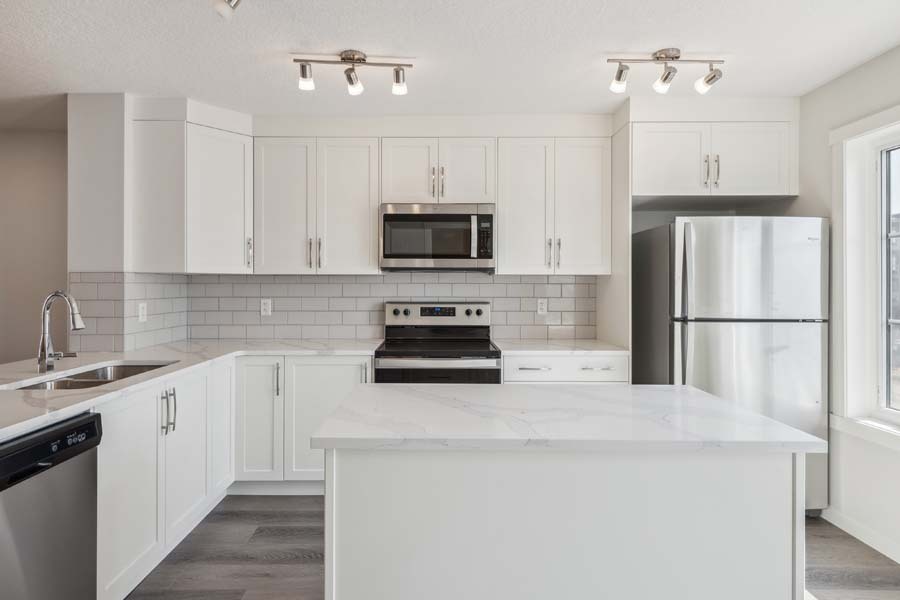A Net Zero Home is designed to balance the energy it consumes with the energy it produces—this results in a net energy consumption of precisely zero over the course of a given year. This is accomplished through the use of energy-efficient building materials, modern construction techniques, and renewable energy sources. Energy-efficient appliances are a key part of this equation, and an important part of lowering overall energy usage for everyday tasks (like cooking, heating, refrigeration, and cooling).
Avalon Homes is a leader in the construction of net zero homes. We want to help you be informed by detailing out the top 5 energy-efficient appliances we consider in our projects. Let’s dive in, together.
1. Air Source Heat Pumps (ASHP)
Air source heat pumps (ASHP) work by transferring heat between the inside and outside of your home. By utilizing the surrounding environment, and not having to rely on generating direct heat, these units increase the efficiency of your heating and cooling by a notable margin when compared to furnaces or air conditioners.
ASHP’s really stand out when you look at a metric called the coefficient of performance (COP). COP measures the ratio of heat output to energy input. Many modern heat pumps maintain high COP ratings, even in our colder Canadian climates. This allows homeowners to stay comfortable year-round, while at the same time reducing energy consumption, greenhouse gas emissions, and utility costs.
2. Heat Pump Water Heaters
Heat pump water heaters (HPWHs; sometimes referred to as hybrid electric water heaters) are a major disruptor when it comes to energy-efficient hot water production. Unlike traditional electric water heaters, which generate heat directly, HPWHs extract heat from the surrounding air and transfer it to the water. This process makes them 2-3x more efficient, while at the same time using significantly less electricity.
For every dollar spent on heating with a traditional forced-air furnace or electric water heater, an air-source heat pump (ASHP) or heat pump water heater (HPWH) delivers 3–4 in equivalent heating value. In other words, you’re not just saving a portion of the costs—you’re effectively multiplying the value of every dollar spent.
Energy Star-certified HPWHs are ideal for net zero homes, offering substantial savings on energy bills while maintaining reliable hot water supply. They also perform well in different climates; many models are equipped to handle our harsh Canadian winters. By reducing energy demand for water heating—one of the largest household energy uses—HPWHs contribute directly to your net zero goals.
3. Energy-Efficient Refrigerators
Improved insulation and high-efficiency compressors have led to the modernization and optimization of refrigeration units. Today’s top models use significantly less electricity without sacrificing food freshness, quality, or preservation.
Energy Star-certified refrigerators have met the stringent standards of the U.S. Environmental Protection Agency (EPA). Selecting one ensures you’re choosing a top-of-the-line model that uses up to 9% less energy than non-certified models. Lower utility bills, reduced carbon emissions, and a more efficient refrigerator are the natural results.
4. Induction Cooktops
If you’re looking for an energy-smart alternative to traditional gas or electric ranges, induction cooktops are the choice for you. The advantage of an induction cooktop is that it heats cookware directly, resulting in faster cooking and less wasted heat.
Gas cooktops are only about 40% efficient, while induction cooktops achieve upwards of 84% efficiency. For net zero homes, they’re the clear winner. They also allow for more precise temperature control and safety features like automatic shut-off, cool-to-touch surfaces, and pan detection.
5. Energy-Efficient Lighting
When we look at the energy usage of a home, lighting eats up a significant portion of it. Using LED bulbs can drastically reduce these demands because they use about 75% less energy than a traditional incandescent bulb. Not only that, they also last longer…up to 25 times the lifespan!
In addition to selecting efficient lighting, proper planning of a home’s layout is also important to saving energy. Maximizing natural light through open layouts, strategic window placement, and even reflective surfaces can reduce the need to artificial lighting during the day.
To achieve net zero consumption, energy-efficient appliances have to be a part of the conversation. From heating, cooling and temperature regulation, to food storage, cooking and lighting—the right choices need to be made. From the obvious to the nuanced, a trusted partner will help you get it right. Avalon Homes is dedicated to helping homeowners design and build sustainable homes for the future—contact us today to get started.


